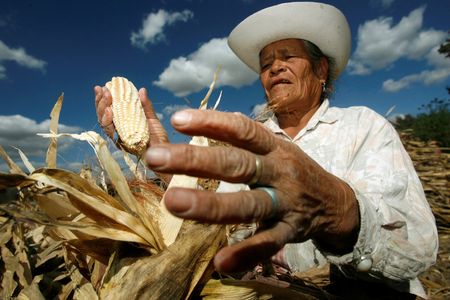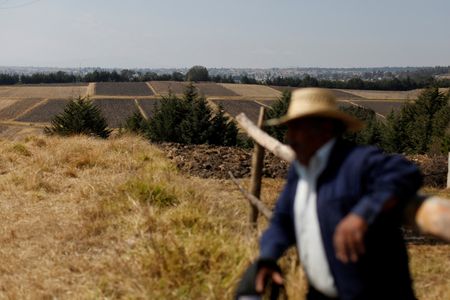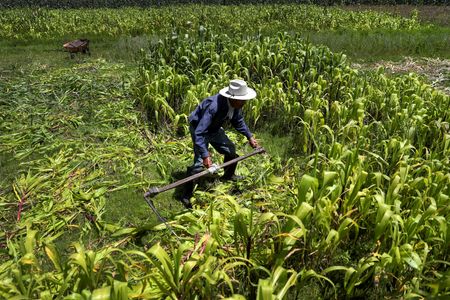By Cassandra Garrison
MEXICO CITY (Reuters) – A broad coalition of Mexican lawmakers is pushing to ban nearly 200 chemicals used in pesticides, saying they endanger human health, and the plan has alarmed farmers who say the move could devastate the country’s food production.
There is a growing movement in Mexico against the use of pesticides and genetically modified crops, but some in the government have said the latest proposal goes too far, too fast.
Mexico has already started phasing out the herbicide glyphosate, found in Roundup, in a presidential decree that seeks to ban genetically modified corn in 2024.
In the coming days, Senate committees are expected to weigh support for the plan to phase out in 2024 183 different chemicals contained in pesticides commonly used in agriculture, gardening and in homes. If approved, it would move to a vote in the Senate and then the lower house.
The plan enjoys backing from senators from Lopez Obrador’s MORENA party, the opposition, the Senate’s health commission president and Mexico’s Deputy Agriculture Secretary Victor Suarez.
The proposed bill pushes alternatives like bioinputs, products made from plant or microorganism extracts, to replace the need for pesticides.
The bill lists some chemicals already banned widely, like DDT, but also includes insecticides Deltamethrin and Clothianidin used to treat crops and found in some Raid products.
S.C. Johnson, the maker of Raid, did not respond to a request for comment.
Supporters say the proposal puts Mexico at the heart of a global movement to restrict dangerous pesticides. Critics warn it would go well beyond steps taken in other countries seen as tough on pesticides such as in Europe, banning chemicals allowed in those places.
“There will be those who do not agree… But most of us are supporting our president’s project and we are going to win the vote,” MORENA Senator Ana Lilia Rivera Rivera, one of the lawmakers behind the initiative, told Reuters.
Asked about the proposal during a regular news conference on Wednesday, Lopez Obrador said it was important to put health first. He gave no further details.
Mexico’s top farm lobby, the CNA, which represents more than 2 million producers, issued a statement last week blasting the bill as “ideological” and warning it could have devastating effects for farmers and consumers.
Mexico’s Union of Manufacturers and Formulators of Agrochemicals (UMFFAAC), which represents about 35% of the crop protection market, said the ban would eliminate 60% of the pesticides currently registered in Mexico. The group’s president, Luis Eduardo Gonzalez Cepeda, predicted a ripple effect in which lower pest control would reduce Mexican profits and increase reliance on foreign imports.
“The farmer would no longer be profitable and stop producing,” Gonzalez told Reuters.
Deputy Agriculture Secretary Suarez, a vocal critic of agrochemicals, said the initiative enables Mexico to apply the so-called precautionary principle, a “safety first” approach.
“When the industry says, ‘give me the scientific evidence that they do harm.’ No, you give me the scientific evidence that they don’t do harm. The proof is on you, not me,” Suarez said in an interview with Reuters in October.
But Suarez’s boss, Agriculture Minister Victor Villalobos, warned the Senate last month that banning pesticides quickly could lead to food insecurity and higher prices, angering some close to the president who thought he was defying Lopez Obrador’s decree.
If approved, the pesticide ban could have implications for Mexico’s trade partners, including the United States, according to Sharon Bomer Lauritsen, a former U.S. government official involved in agriculture trade negotiations.
Mexico could be required to do its own studies on pesticides it wants to ban that already have international guidelines.
“A trade conflict could arise if Mexico has not done the in that required risk assessment, and there is an impact on trade,” she said.
(Reporting by Cassandra Garrison; editing by Stephen Eisenhammer and David Gregorio)



